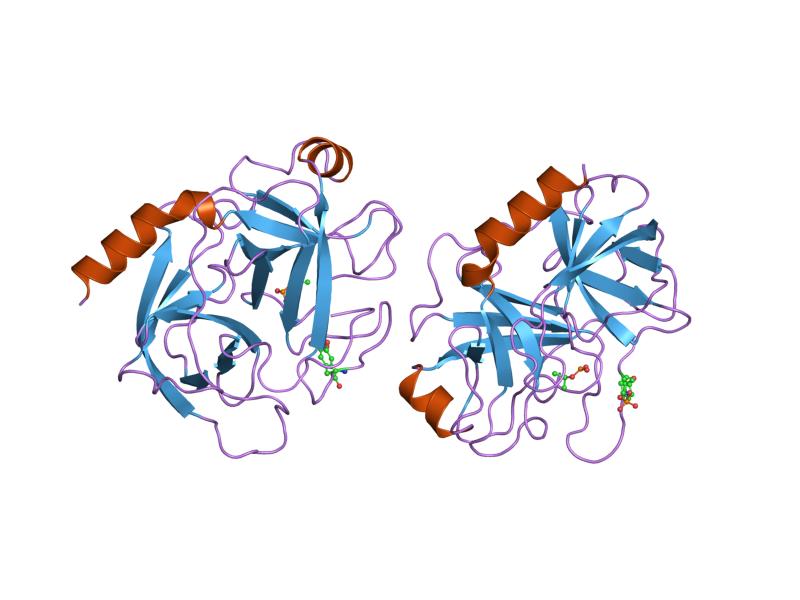In vitro diagnostic (IVD) antibodies are widely used to detect diseases, infections, and other pathological conditions. As a leading antibody supplier, Creative Biolabs is specialized in the development of IVD antibodies against a variety of disease markers with high sensitivity and low cross-reactivity. Especially, trypsinogen-2 is a promising indicator for the early diagnosis and prognosis of inflammatory pancreatitis. We can provide customized antibody development services targeting this marker.
Introduction of Trypsinogen-2
Trypsinogen is an inactive precursor of trypsin, which can be classified into three major isoenzymes in humans: trypsinogen-1 (cationic trypsinogen form), trypsinogen-2 (anionic trypsinogen form), and trypsinogen-3 (meso trypsinogen) with 23.1%, 16%, and 0.5% of total pancreatic secretory proteins, respectively. Trypsinogens is secreted from acinar cells into pancreatic juice. Trypsinogen-2 is activated by enterokinase (EK) that is located on the brush border membrane of enterocytes in the duodenum. The activation of trypsinogen-2 results in the formation of trypsin, a serine protease found in the digestive system of many vertebrates, where it hydrolyzes proteins at the carboxyl side of the amino acids lysine or arginine. The activation peptide at the amino terminus of vertebrate trypsinogen contains the highly conserved sequence Asp-Asp-Asp-Asp-Lys (D4K).
 Fig.1 Structure of trypsinogen-2.1
Fig.1 Structure of trypsinogen-2.1
Trypsinogen-2 Marker for Pancreatitis
Numerous studies have been demonstrated that intrapancreatic activation of trypsinogen to trypsin plays a crucial role in the pathogenesis of acute pancreatitis. Normally, the serum concentration of trypsinogen 1 is higher than trypsinogen 2 in healthy subjects, whereas in acute pancreatitis patients the trypsinogen 2 levels are aberrantly higher. High concentrations are associated with severe pancreatic damage. Subsequently, the inappropriate activation of trypsinogen triggers a pancreatic enzyme cascade that activates the remaining zymogens, resulting in autodigestion of the surrounding tissue. It has been reported that several types of mutant forms of trypsinogen may be associated with pancreatitis. Therefore, the trypsinogen-2 test can be regarded as a valuable adjunct in the early prediction or assessment of the severity of acute pancreatitis.
IVD Antibody Development Services for Trypsinogen-2 Marker
Early identification of acute pancreatitis is of great importance because rapid therapeutic interventions improve outcome. Trypsinogen-2 ideally meets the organ-specific criteria for biomarkers because the production of trypsin is from premature trypsinogen activation in the pancreas. Therefore, the development of IVD antibodies against trypsinogen-2 is essential for the prognosis, diagnosis, and therapeutic monitoring of pancreatitis.
Creative Biolabs has built a versatile IVD platform to provide custom biomarker-specific IVD antibody development services to global clients. Especially, we offer high-quality IVD antibody development services for the trypsinogen-2 marker. Besides, Creative Biolabs provides one-stop diagnostic immunoassay development services, including feasibility analysis, assay design, assay protocol establishment, validation, and production.
Along with over a decade of rich experience in providing excellent custom services for IVD antibody discovery, our services can totally meet your special requirements. If you are interested in our services, please do not hesitate to contact us for more details.
Reference
- From Wiki: By awahar Swaminathan and MSD staff at the European Bioinformatics Institute - http://www.ebi.ac.uk/pdbe-srv/view/images/entry/1trn600.png, displayed on http://www.ebi.ac.uk/pdbe-srv/view/entry/1trn/summary, https://commons.wikimedia.org/wiki/File:PDB_1trn_EBI.jpg
For Research Use Only.